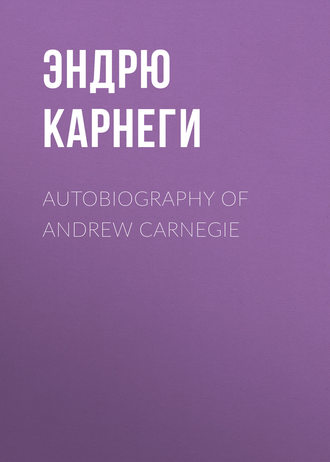
Autobiography of Andrew Carnegie
Campbell-Bannerman was chosen leader of the Liberal Party in December, 1898.
65
Mr. Carnegie had received no less than fifty-four Freedoms of cities in Great Britain and Ireland. This was a record—Mr. Gladstone coming second with seventeen.
66
The whole paragraph is as follows: "How beautiful is Dunfermline seen from the Ferry Hills, its grand old Abbey towering over all, seeming to hallow the city, and to lend a charm and dignity to the lowliest tenement! Nor is there in all broad Scotland, nor in many places elsewhere that I know of, a more varied and delightful view than that obtained from the Park upon a fine day. What Benares is to the Hindoo, Mecca to the Mohammedan, Jerusalem to the Christian, all that Dunfermline is to me." (An American Four-in-Hand in Britain, p. 282.)
67
An American Four-in-Hand in Britain.
68
"Mr. Carnegie had proved his originality, fullness of mind, and bold strength of character, as much or more in the distribution of wealth as he had shown skill and foresight in its acquisition. We had become known to one another more than twenty years before through Matthew Arnold. His extraordinary freshness of spirit easily carried Arnold, Herbert Spencer, myself, and afterwards many others, high over an occasional crudity or haste in judgment such as befalls the best of us in ardent hours. People with a genius for picking up pins made as much as they liked of this: it was wiser to do justice to his spacious feel for the great objects of the world—for knowledge and its spread, invention, light, improvement of social relations, equal chances to the talents, the passion for peace. These are glorious things; a touch of exaggeration in expression is easy to set right.... A man of high and wide and well-earned mark in his generation." (John, Viscount Morley, in Recollections, vol. II, pp. 110, 112. New York, 1919.)
69
Mr. Carnegie acquired no less than eighteen British newspapers with the idea of promoting radical views. The political results were disappointing, but with his genius for making money the pecuniary results were more than satisfactory.
70
Triumphant Democracy, or Fifty Years' March of the Republic. London, 1886; New York, 1888.
71
The estimated value of manufactures in Great Britain in 1900 was five billions of dollars as compared to thirteen billions for the United States. In 1914 the United States had gone to over twenty-four billions.
72
An Autobiography, by Herbert Spencer, vol. I, p. 424. New York, 1904.
73
"An occasion, on which more, perhaps, than any other in my life, I ought to have been in good condition, bodily and mentally, came when I was in a condition worse than I had been for six and twenty years. 'Wretched night; no sleep at all; kept in my room all day' says my diary, and I entertained 'great fear I should collapse.' When the hour came for making my appearance at Delmonico's, where the dinner was given, I got my friends to secrete me in an anteroom until the last moment, so that I might avoid all excitements of introductions and congratulations; and as Mr. Evarts, who presided, handed me on the dais, I begged him to limit his conversation with me as much as possible, and to expect very meagre responses. The event proved that, trying though the tax was, there did not result the disaster I feared; and when Mr. Evarts had duly uttered the compliments of the occasion, I was able to get through my prepared speech without difficulty, though not with much effect." (Spencer's Autobiography, vol. II, p. 478.)
74
James Knowles, founder of Nineteenth Century.
75
"A.C. is really a tremendous personality—dramatic, wilful, generous, whimsical, at times almost cruel in pressing his own conviction upon others, and then again tender, affectionate, emotional, always imaginative, unusual and wide-visioned in his views. He is well worth Boswellizing, but I am urging him to be 'his own Boswell.'… He is inconsistent in many ways, but with a passion for lofty views; the brotherhood of man, peace among nations, religious purity—I mean the purification of religion from gross superstition—the substitution for a Westminster-Catechism God, of a Righteous, a Just God." (Letters of Richard Watson Gilder, p. 375.)
76
"A code had been agreed upon between his friends in the United States and himself, and when a deadlock or a long contest seemed inevitable, the following dispatch was sent from Mr. Carnegie's estate in Scotland, where Blaine was staying, to a prominent Republican leader:
"'June 25. Too late victor immovable take trump and star.' Whip. Interpreted, it reads: 'Too late. Blaine immovable. Take Harrison and Phelps. Carnegie.'" (James G. Blaine, by Edward Stanwood, p. 308. Boston, 1905.)
77
The reference is to an article by Mr. Carnegie in the North American Review, August, 1898, entitled: "Distant Possessions—The Parting of the Ways."
78
Published in Thayer, Life and Letters of John Hay, vol. II, p. 175. Boston and New York, 1915.
79
In the deed of trust conveying Pittencrieff Park and Glen to Dunfermline an unspecified reservation of property was made. The "with certain exceptions" related to King Malcolm's Tower. For reasons best known to himself Mr. Carnegie retained the ownership of this relic of the past.
80
The Roosevelt Policy: Speeches, Letters and State Papers relating to Corporate Wealth and closely Allied Topics. New York, 1908.



